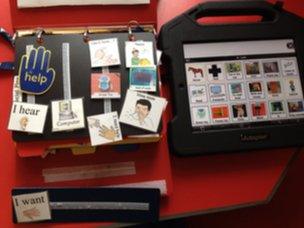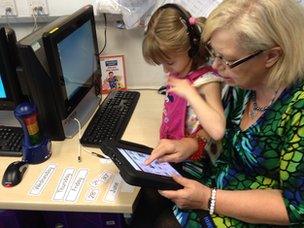Apps and autism
- Published
- comments
Rory Cellan-Jones reports on the new app for children who cannot speak
New technology can be inspiring, exciting or sometimes infuriating - but I can't ever remember it being really moving. Until, that is, I met Ruby Dunn, whose life is being changed by a piece of software.
Ruby, who was born 14 weeks premature in 2006, has autism and has never spoken. She does, however, attend her local school - Sandford Primary in Somerset - and is well integrated into every aspect of school life. But it is an app which she uses on an iPod and an iPad which is making a big difference.
Ruby uses the app, Proloquo2Go, external, to communicate with her teachers, her family and other children. She taps on symbols, constructs a sentence and out it comes, spoken in a child's voice. So in the playground, she taps "head, shoulders" to choose a game. At lunchtime she chooses "lasagne" and "carrots" adds "please" and "Tina" and hands it to the dinner lady. And in the classroom she reads a story and then taps out answers to questions about it via the iPad version of the app.

Old tech and new tech
Pauline Hoy Green, Ruby's one-on-one learning support assistant, explained to me that the app had replaced a less hi-tech communications tool - a book with stick-on pictures of various objects. The app, which has been updated recently and features the voices of two British children, eases the frustrations of a child who seems desperate to make the world understand her. "It's given her a voice," Pauline says.
Spending a day watching Pauline and Ruby at work was fascinating. All my assumptions about the capabilities of a child with autism were challenged as she used the app in all sorts of sophisticated ways. Ruby appeared to be more confident with the technology than many an adult and that was confirmed by her father Craig when he arrived to pick her up at the end of the school day.
He told me that his daughter used the app at home to "twist me round her little finger," and that IT in general was a big part of her life. "She's even shown me how things worked on Sky+ that I didn't know about."

Ruby and Pauline using the app
Now as apps go, Proloquo2Go is pretty expensive - £129.99 - and there is plenty of cheaper software, for a range of devices and operating systems, aimed at helping children with autism. But for Ruby's family and for many others getting access to the right technology is now a priority.
I talked to Carol Allen - who's worked in this field for a long time. She says that if an app can give children a voice it is worth the expense. "Why can't we see that it is the same as giving a wheelchair to someone who can't walk?"
"People are going app crazy," Carol said, explaining that they were beginning to have a really big impact on the way children with all kinds of special needs were taught. Some teachers were even creating their own apps, tailored to the needs of a specific child.
But she also had some words of caution. "You have to start with the needs of the learner, and the teaching - not with the shiny kit." And she pointed out that new technology did not always match up to expectations. "Look at electronic whiteboards - people said they were the solution to everything. But they didn't work for the visually impaired."
In all areas of education, a lively debate is under way about the contribution that new technology can make, and just how much needs to be spent on it. But children like Ruby Dunn - and the people who work with them - are giving everyone else an example of how life-enhancing the right technology can be.